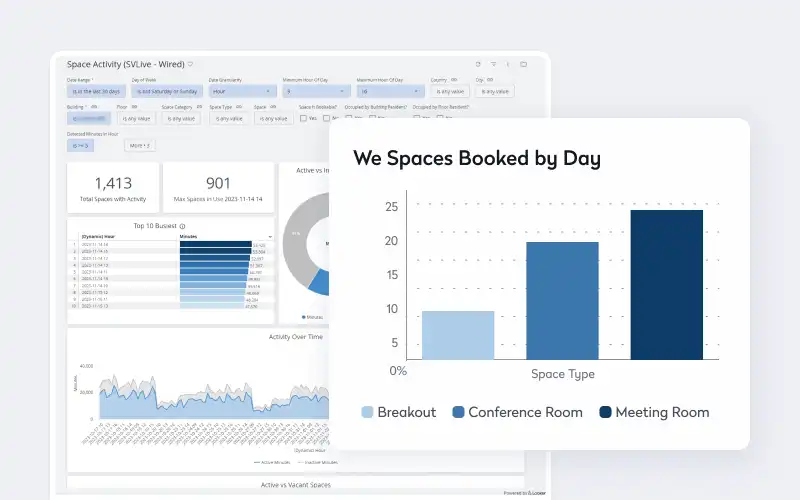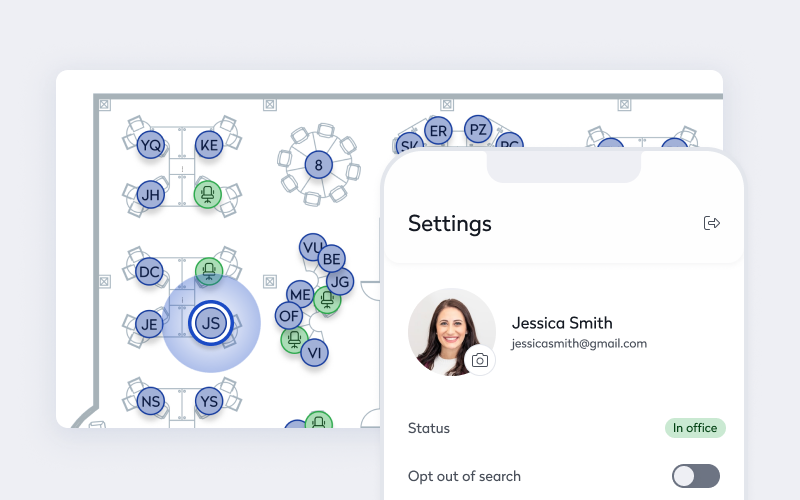
Key takeaways
- Hybrid work is reshaping corporate real estate strategy. Companies are downsizing, reconfiguring, and investing in flexible, tech-enabled spaces to balance cost-efficiency with employee experience.
- Data-driven tools are critical for portfolio optimization. Unified workplace management software consolidates occupancy, cost, and utilization data, enabling CRE leaders to make informed, real-time decisions.
- Modern worktech streamlines every aspect of CRE management. From interactive space planning to integrated booking systems and visitor management, technology enables efficiency, compliance, and collaboration.
The corporate real estate (CRE) landscape is undergoing significant transformation, driven by shifts in workforce dynamics, economic pressures, and technological advancements. As companies embrace hybrid work models, many are re-evaluating their real estate portfolios to balance cost-efficiency with employee needs.
According to Deloitte’s 2024 Commercial Real Estate Outlook, businesses are moving toward more flexible, tech-enabled workspaces to optimize space utilization while enhancing the employee experience. With 63% of executives planning to reduce or reconfigure office space in the next year, there’s a clear trend toward downsizing and repurposing.
Sustainability is also a key focus, with 77% of real estate firms emphasizing investments in green technology and eco-friendly infrastructure. As pressure mounts to meet both environmental regulations and cost-cutting goals, the demand for data-driven tools that provide real-time insights into space utilization, occupancy, and energy efficiency has never been higher.
With these trends reshaping the corporate real estate market, businesses are turning to advanced solutions that simplify property management and improve decision-making.
Leveraging smart analytics and automation, companies can make data-driven decisions to optimize their real estate portfolios, reduce costs, and enhance the employee experience. At the heart of these efforts is a robust workplace management software solution that helps leaders automatically capture data that they can then leverage into business intelligence.
How modern worktech supports corporate real estate management
A modern, unified solution empowers corporate real estate (CRE) managers with the tools they need to optimize space utilization, reduce costs, and create a more efficient workplace environment.
By combining robust analytics with intuitive space planning features, the software helps managers ensure that real estate decisions are not only data-driven but also increase productivity by supporting employee connection and collaboration.
Streamlined data from multiple sources
Strategic real estate management is only possible when you have the right data at your fingertips. Unfortunately, many CRE leaders are still using disparate systems to capture data on square footage, occupancy, and costs. As they purchase new buildings, they inherit legacy space management systems and on-site IWMS software, which makes it difficult for them to obtain data when they need it.
These outdated systems often don’t integrate well with each other, forcing managers to manually export, sort, cross-reference, and compare data.
By consolidating data from multiple sources into one mobile platform, managers can gain critical insights, including:
- Total square footage
- Costs by building, floor, or department
- Occupancy rates
Sensors throughout a facility help managers capture real-time space occupancy data for accurate utilization data.
Space utilization and monitoring
Modern occupancy software helps organizations monitor office space usage in real time, providing insights into occupancy patterns and peak utilization, insights that are critical for determining how employees interact with workspaces and identifying areas where space can be optimized.
Features like automated data collection and visualization tools allow companies to uncover trends and project future real estate needs, ensuring that workspace allocation keeps up with growth rates and changing demands.

Workspace planning and reconfiguration
Whether businesses are looking to reconfigure existing spaces or plan for office moves, modern, digital space planning simplifies the process with interactive dashboards and drag-and-drop tools. Corporate real estate managers can easily visualize space accommodations, track resources, and plan individual or group moves.
These capabilities reduce the complexity of managing large-scale relocations or office reconfigurations, ensuring that all stakeholders are informed and that every space is compliant with internal and regulatory standards.
Integrated collaboration and booking systems
In today’s hybrid work environment, collaboration is key, and modern worktech makes it easy for employees to plan their workweek by showing when teammates are in the office and which workspaces are available.
Industry-leading platforms integrate seamlessly with Microsoft 365 to offer calendar-based workspace booking, ensuring that meeting rooms and collaboration areas are available when employees need them. This not only encourages teamwork but also improves overall office efficiency by reducing wasted space.

Visitor and access management
Visitor management systems sync visitor and employee data with access control. Visitors can receive QR codes for entry, and real-time tracking provides security teams with visibility into who is on-site at any given time, ensuring businesses maintain health, security, and compliance objectives while delivering a seamless visitor experience.
Take your CRE management to the next level
As the corporate real estate landscape continues to shift, it’s more important than ever to have the data you need to make informed decisions. From space utilization tracking to visitor management, Eptura offers comprehensive tools that streamline real estate management and help organizations adapt to the future of work.
Frequently asked questions
Shifts toward hybrid work, rising operational costs, and a greater focus on sustainability are prompting companies to downsize, repurpose, or redesign their workspaces to match actual usage and employee needs better.
It centralizes data from multiple sources, tracks real-time occupancy with sensors, streamlines space planning, and integrates booking and visitor management, removing inefficiencies from manual or disconnected systems.
Occupancy tracking and analytics reveal usage patterns and peak demand, allowing managers to optimize layouts, reallocate resources, and plan future real estate needs based on accurate, up-to-date data.


